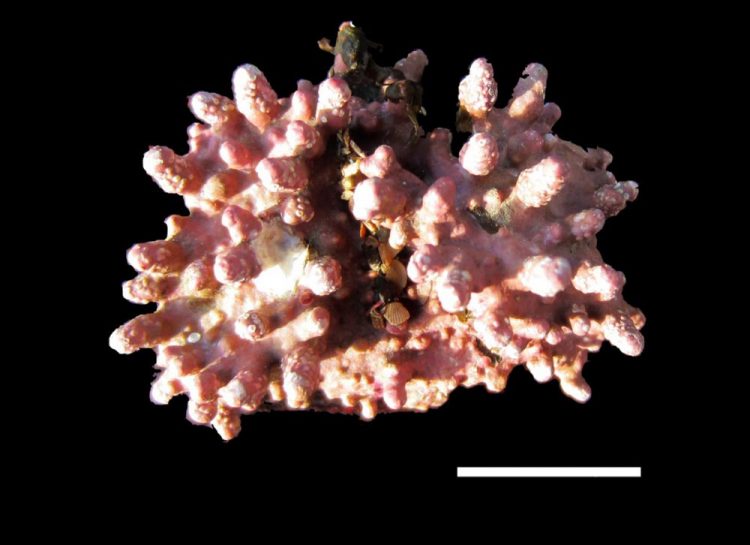Ocean acidification makes coralline algae less robust

This is coralline algae (with a scale bar of 1cm). New research from the University of Bristol, UK has found that ocean acidification is affecting the formation of the skeleton of coralline algae which play an important part in marine biodiversity. Credit: Leanne Melbourne
Coralline red algae form maerl beds which provide important habitat in shallow waters, including the UK coastal shelf. Maerl hosts a high diversity of organisms by providing habitats, shelter and nursery areas for, amongst others, fish larvae and young scallops. Both coralline algae and the maerl beds they generate are protected by national and international regulation as they form biodiversity hotspots and support fisheries.
The skeletal structure of coralline algae is composed of high- magnesium calcite, the most soluble form of calcium carbonate, and is therefore potentially vulnerable to the change in carbonate chemistry resulting from the absorption of man-made CO2 by the ocean.
Previous Bristol-led research has shown that ocean acidification affects coralline algae by reducing the thickness of their cell walls and thus their structural strength, crucial for withstanding natural stresses such as wave movement or grazing. It also showed that, given enough time, the algae can acclimatise and continue to grow.
In a new study, published today in Scientific Reports, Dr Federica Ragazzola and colleagues assessed this new growth to see whether it is of the same quality as before and hence whether coralline algae are able to grow as strong a skeleton under climate change conditions. The strength of this skeletal structure is important as it impacts the ability of alga to provide shelter for other species.
The researchers found that, under ocean acidification, the chemical composition of the skeleton is changing, making it potentially more brittle.
Professor Daniela Schmidt, Head of Global Change at the Cabot Institute and senior author of the study said: “Our research suggests that in the near future these organisms are not sufficiently calcified to provide habitat for other species. Coralline algae support a huge variety of marine life, with more than 460 species associated with their beds including economically important species such as scallops.
“While a number of studies have now shown that coralline algae can continue to grow even in challenging environmental conditions, it is fundamentally important that we combine these physiological studies with potential impacts on the structural integrity of the skeleton and its consequences to habitat formation.”
###
Paper
'Impact of high CO2 on the geochemistry of the coralline algae Lithothamnion glaciale' by F. Ragazzola, L.C. Foster, C.J. Jones, T B. Scott, J. Fietzke, Matt R. Kilburn and D.N. Schmidt in Scientific Reports
Media Contact
All latest news from the category: Earth Sciences
Earth Sciences (also referred to as Geosciences), which deals with basic issues surrounding our planet, plays a vital role in the area of energy and raw materials supply.
Earth Sciences comprises subjects such as geology, geography, geological informatics, paleontology, mineralogy, petrography, crystallography, geophysics, geodesy, glaciology, cartography, photogrammetry, meteorology and seismology, early-warning systems, earthquake research and polar research.
Newest articles

First-of-its-kind study uses remote sensing to monitor plastic debris in rivers and lakes
Remote sensing creates a cost-effective solution to monitoring plastic pollution. A first-of-its-kind study from researchers at the University of Minnesota Twin Cities shows how remote sensing can help monitor and…

Laser-based artificial neuron mimics nerve cell functions at lightning speed
With a processing speed a billion times faster than nature, chip-based laser neuron could help advance AI tasks such as pattern recognition and sequence prediction. Researchers have developed a laser-based…

Optimising the processing of plastic waste
Just one look in the yellow bin reveals a colourful jumble of different types of plastic. However, the purer and more uniform plastic waste is, the easier it is to…



